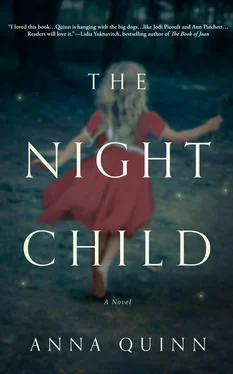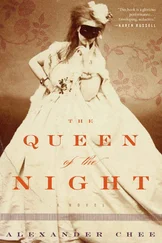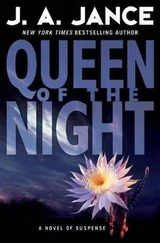“Why must you be brave sweetheart? You’re only a child.”
Nora’s eyes begin to blink rapidly then and well up, and now she is crying jagged sobs that hit the walls and shatter into tiny pieces on the rug and disappear.
Sister Rosa leans forward and gently tries to bring Nora onto her lap, but Nora pushes her away.
“Don’t … Don’t …” Nora says between sobs. She wipes at her eyes with her sweater sleeve, stands up, and walks toward the front door.
“Wait,” Sister Rosa calls, following her. As Nora struggles to pull on her boots, Sister Rosa walks to a little wooden table in the vestibule, opens the top drawer, and lifts out a crystal rosary, each bead an iridescent blue.
She kneels in front of Nora so their eyes are even, Nora’s blue eyes still watery. Sister Rosa helps Nora button her coat and put on her mittens and says, “I know little girls usually receive this at their first communion, but I want you to have it now.” Sister Rosa places the rosary in Nora’s mittened hand and closes her fingers around it.
“Keep it in your pocket, and touch it whenever you need help. And Nora?”
“Yes, Sister?”
“You can call for St. Margaret to help you anytime.”
“Thank you, Sister,” Nora whispers. Sister Rosa opens the heavy door for her, and the cold air is sharp as Nora steps out. She looks back at Sister Rosa.
“Everyone has their own way of being brave,” Sister Rosa says. Nora nods and marches back to school, retracing exactly 256 steps.
Nora’s eyes open then, agitated and off-center. She blinks. The memory had arrived like a heart, pinkish-gray and pulsing, soft without edges. And now, relief: she has placed all the misplaced pieces—the book with the gold lettered title, St. Margaret ; the crown; the sword; the dead dragon; Sister Rosa—into a whole! She did it! David was right about the trauma of her mother beating her, dying in front of her having an impact. She has remembered. She has remembered and now she can move on. She is relieved, pleased.
She licks the crumbs off her lips. With a napkin, she wipes the greasy remnants from the table into her other hand and dumps them into the white bag and folds the bag closed, squishes it, with the one croissant still left inside, into a ball. She will buy new croissants. Around her, people are still drinking coffee and reading things from the newspaper out loud to each other. Life is moving on. She stands, but then she freezes. Here is Paul in his green winter parka and wool hat standing at the counter. Paul is standing there ordering things, and he is holding Fiona’s hand, and next to Fiona is a pretty woman wearing a Seahawks cap. The woman is touching Fiona’s shoulder, touching Fiona’s red coat, smiling big white teeth, and Fiona smiling back, shyly.
Nora’s heart stops and her face grows hot and the room is thick as a dark forest. She watches the barista give each of them a cup with a lid. Fiona holds the cup with both mittened hands and blows into the little hole in the lid. The woman and Paul look at each other with open affection, and then the trio exits, Paul smiling and holding the door open for the woman and Fiona.
The hand takes the third croissant out of the white paper bag and breaks it into little pieces and feeds it to the ravenous mouth.
“What did you two do this morning?” Nora asks, falsely nonchalant, once the three of them are sitting together at home, eating grilled cheese sandwiches. She wants to see how Paul responds, a part of her hoping the attraction she witnessed was imagined.
“Not much,” Paul shrugs, his casual tone as exaggerated as her own.
“We went for a walk with Elisa, and we drank hot chocolate in the park,” Fiona says cheerfully, unaware of life’s complexities.
“Elisa?” Nora says, adrenaline beginning to pump, and she isn’t sure she won’t start crying.
“You know her, Mommy—the lady who plays the violin—the lady next door.”
“Christ, can you lighten up?” Paul says later, after Fiona has gone off to the playground with her friend, Sarah.
“She touched Fiona,” Nora whispers, clenching her coffee cup until her knuckles are white.
“Nora! Come on! It was hot chocolate. It didn’t mean a thing.”
“It goddamn means a thing to me!” she shrieks, and now the mug is flying through the air, a visible obscenity, hitting the refrigerator and shattering into bits at Paul’s feet.
“You’re crazy,” he yells, grabbing his coat from the hall closet, walking out, slamming the door.
“Bastard!” she shouts.
And when Sarah’s mother calls to ask if Fiona can spend the night, “The girls are having so much fun!” Nora is relieved and climbs into bed with her clothes on. And when she hears Paul come home at 3:00 a.m. and walk unsteadily to the living room couch, she closes her eyes and tries not to think about where he’s been.
CHAPTER THIRTEEN: January 27, 1997
“Sister Rosa sounds lovely,” David says, his face expectant as a blank page. He is dressed in jeans and a rumpled shirt with rolled-up sleeves, his hair as rumpled as his shirt. Suddenly she wants to kiss him. Even though he is old enough to be her father, she wants to devour him, get lost in him, lose herself in him. Startled by this urge, the transparent cliché of it, she turns away, embarrassed, tries to clear her mind of it, but ends up closing her eyes and imagining the intimate perfection of his lips on hers.
“Nora? Are you with me?”
She opens her eyes, confused and flustered. The image gone, dissolved, defunct. The reality of her cracked life back, her past a malevolent undertow she cannot escape from simply by swimming parallel to and waiting for release; no, this is a force demanding a surrender she cannot allow.
She sits guiltily, hoping her dreaming, her lust, will not be evident. She thinks of how she must look: dark jeans, black T-shirt, heavy black Doc Martens shoes, all of it overtly unfeminine, undeniably hands-off. Of course he wouldn’t desire her. She hears then the small clock on the cabinet next to her, ticking, ticking, ticking. She clenches and unclenches her fists.
“Nora?”
She needs the clock to stop ticking.
“Nora?”
“It’s … the clock,” she says. “It’s the ticking—”
“I’ll move it,” David says. He rises, picks up the clock and places it in the bottom drawer of his desk across the room, and sits back down.
“Paul looked like he was in love,” she says.
“You mean when you saw him at the coffee shop?”
“Yeah.”
“Do you want to talk about that?”
She doesn’t know what to talk about. She is conscious her thoughts are lurching and spinning and fear is creeping in with its jagged edges and she works hard now to reassure herself she is fine, but she is not succeeding. She wants him to take charge, tell her what to say and do.
“Nora?”
“Sister Rosa told me to pray to Saint Margaret if I was scared. Why would she say that? I mean obviously, nuns tell you to pray to the saints, but she seemed to think I should specifically pray to St. Margaret. And now with the voice calling herself Margaret—” she can still hear that clock. She puts her hands over her ears and begins to rock back and forth slightly. “The clock,” she whispers.
“Nora, it’s okay. Here, I’ll put it down the hall.” He pulls the clock out of the drawer and leaves her there for a few moments. She presses her spine into the back of the couch and grabs the raven pillow and the room is so silent she can hear the ticking of her heart, a ticking that grows louder now, TICK TICK, mocking her, TICK TICK, you can’t hide, TICK TICK—
“There, how’s that?” David asks, back now, sitting down, once again on his chair, his voice not the least impatient.
Читать дальше












